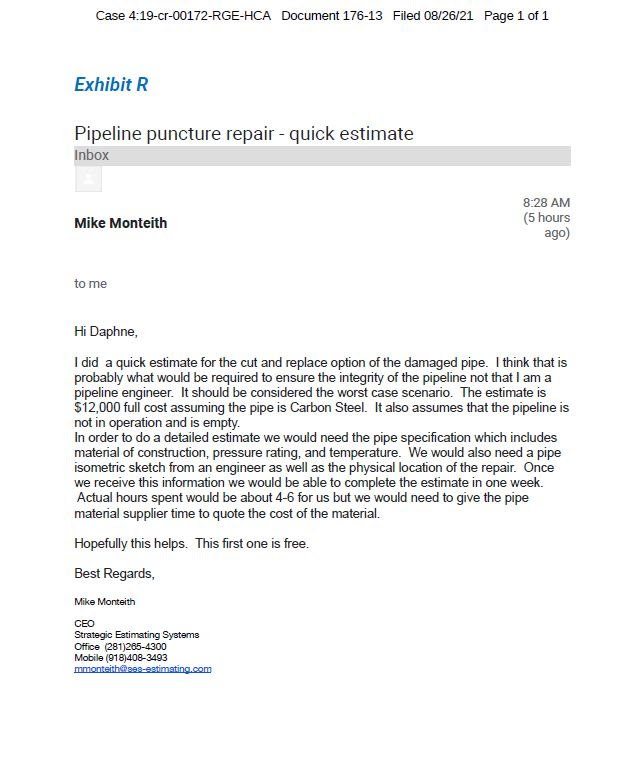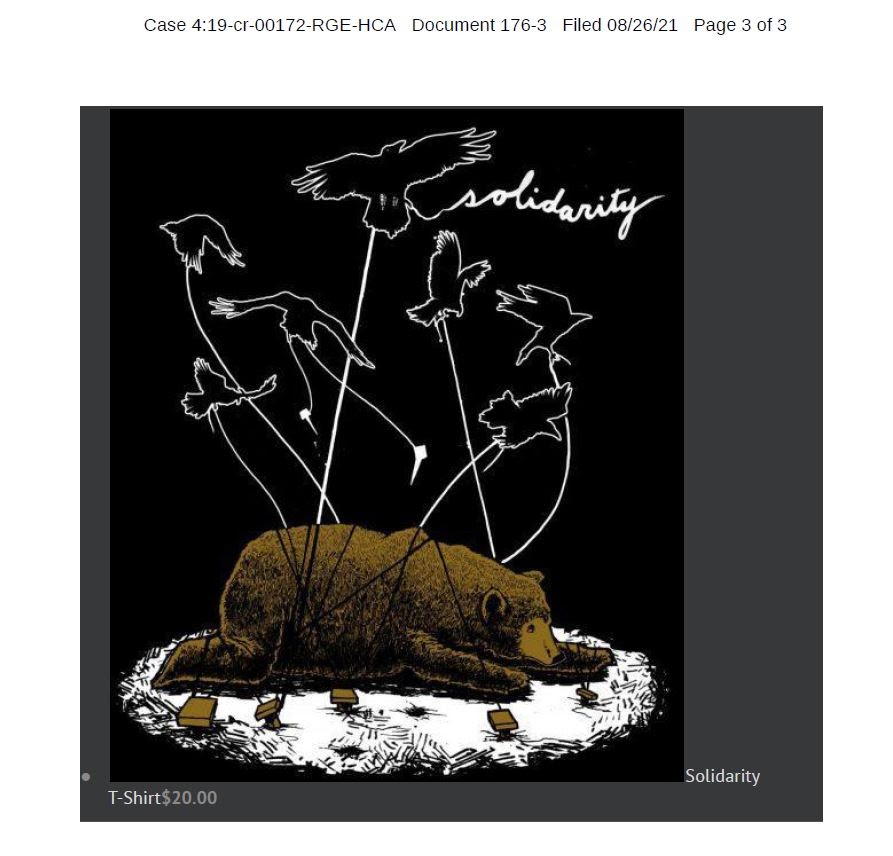Ruby Montoya Seeks to Withdraw Guilty Plea, Citing Coercion, Entrapment and Mental Health
Iowa City, IA – On August 26, admitted Dakota Access Pipeline saboteur Ruby Montoya filed a motion in federal court seeking to withdraw her guilty plea, claiming she was coerced into signing it by her previous attorneys, movement “leaders”, and her abusive father. The motion also claims that government agents may have taught Montoya to use a welder and encouraged her to use it for pipeline sabotage, indicating a possible entrapment defense.
Montoya’s attorneys also filed a sealed supplement to her motion, citing “discussions of mental health and the attorney/client relationship, as well as other reasons” for restricting it from public view. The contents of this supplement are currently unknown to the public.
Activists charged with crimes associated with their political activity generally avoid filing sealed documents to the court out of fear that the secrecy may be taken as a sign that they are offering information to law enforcement about other activists in exchange for a lighter sentence.
Montoya was previously represented by Lauren Regan, a prominent attorney with the Civil Liberties Defense Center in Oregon who has represented environmental and political activists for more than 15 years. Montoya is also represented by local Des Moines attorney Angela Campbell. Montoya is now represented by Daphne Silverman, who is based in Austin, TX.
In July 2017, Montoya and Jessica Reznicek, another anti-pipeline activist, publicly admitted to a campaign of arson and property destruction against the Dakota Access Pipeline. The two were arrested more than two years later in September 2019, indicted on nine federal charges each and placed on house arrest pending court proceedings.
BREAKING: Two women claim responsibility for sabotaging Dakota Access Pipeline, dismantle Iowa Utilities Board sign, then arrested #NoDAPL pic.twitter.com/wEQRTtwcrs
— UNICORN RIOT 🦄 (@UR_Ninja) July 24, 2017
At the time, Montoya claimed she felt confident in her decisions and ready to face the legal consequences of her actions. “I am not going to choose fear,” Montoya said in a public address in 2017. “I’m looking at centuries in prison — and I feel more free.”
In February of this year, both Montoya and Reznicek entered into a plea agreement in which they each pleaded guilty to one count of damaging an energy facility. In exchange for their admission of guilt, the remaining charges against them were dropped. After signing the agreement, the pair faced a maximum of 20 years in prison and a $250,000 fine, in part as the result of a “terrorism enhancement” applied at sentencing.
On June 30, Reznicek was sentenced to 8 years in prison.
Despite her previous admission of guilt, Montoya’s recent motion cites a variety of reasons why she claims the plea she signed was “not voluntary.” Although Montoya continues to admit she committed the arson and other property destruction against the pipeline, she now argues that the previous plea failed to consider a variety of mitigating factors that led to her actions.
Foremost among those factors, her attorneys argue, is her mental health, caused by a childhood of abuse by her father, Phoenix civil rights attorney Stephen Montoya, who was also part of her original legal team. The motion includes affidavits from several family members, as well as Montoya herself, attesting to the abuse she suffered from her father. The motion also includes evidence of a restraining order Montoya was granted against her father in 2008.
“Ms. Montoya did not have the requisite mens rea to commit the crimes alleged,” her new attorneys argue in the motion, referring to the presence of mind and knowledge of wrongdoing required to be found guilty of a crime. “The statutes charged require that she act knowingly or maliciously depending upon the statute,” the motion continues. “Ms. Montoya did not act knowingly or maliciously on any occasion.”
Montoya claims that her attorneys failed to adequately defend her interests and coerced her to take the joint plea deal offered to her and Reznicek. Reznicek, she claims, faced a harsher sentence due to her previous years of activism and many arrests. If sentenced alone, Montoya claims, she’d likely face less jail time.
“Ms. Montoya’s past does not include prior similar acts,” the motion reads, “and therefore her risk at trial is different than Ms. Reznicek and at sentencing with regards to application of the terrorism enhancement, her guideline range and her appropriate sentence within the guideline range are different than Ms. Reznicek.”
The motion also points fingers at other anti-pipeline activists, most notably the Des Moines Catholic Worker community where Reznicek and Montoya lived for a period of time. According to Montoya, activists at the Des Moines Catholic Worker failed to adequately warn her that she was committing serious crimes.
“Ms. Montoya was then coerced by the activist community within the Catholic Worker Des Moines,” the motion reads. “This activist community offered the opportunity to engage in destruction but did not give Ms. Montoya the information and other tools she needed to evaluate what they requested.”
In Montoya and Reznicek’s previous public statements, the pair claimed that they acted in secret without the knowledge or involvement of other activists. “It’s insulting on some level,” Reznicek said in a 2017 joint interview with Montoya, “but it needs to be cleared up. Ruby and I acted solely alone. Nobody else was involved in any of these actions. I think it’s hard for people to believe ― ‘How could these two women pull this off so easily?’”
The indication in the motion that other activists offered her the “opportunity” and “tools” to engage in crimes suggests that Montoya plans to allege the knowledge or even leadership of others in the crimes she’d previously confessed to.
In an affidavit to the court, Montoya’s counselor, Tucker Brown, who claims to have been himself associated with the Catholic Worker Movement for over 20 years, further seeks to cast blame for Montoya’s actions on other activists. Brown states that leaders of the Des Moines Catholic Worker movement have “often lacked moral clarity” and “tended to coerce vulnerable persons into actions for which they were not psychologically prepared.” According to Brown, activists sought to “lure impressionable and unstable persons into their cause” and deployed “increasingly erratic” tactics.
This attempt to cast blame for Montoya’s actions onto other activists contradicts her numerous previous public statements. In an August 2017 interview, Montoya stated “We anticipated the repercussions of every action that we took. Although I view these repercussions as unjust, we were fully prepared going into it, in that mental mind game of ‘I’m driving myself to jail right now.’ So we’ve been prepared for jail for several months, and we still feel passionate about this — I still can’t let this go because this is still really flipping important — and we both have the mental fortitude to step forward. Well, let’s step forward then.”
The recent motion also appears to pave the way for a future entrapment defense, claiming that “a government agent may have encouraged and taught [the defendants] how to use a welder.” No details about this possible entrapment are offered in the motion, but Montoya’s attorneys did state that evidence of this possible entrapment came to light only after Lauren Regan, Montoya’s previous attorney, withdrew from the case.
Typically, when law enforcement provides the tools or plan for a criminal act, such as in the cases of Eric McDavid, the Cleveland 4 and the so-called “Boogaloo Hamas,” they are arrested when agents believe they have collected enough evidence to win the case, typically shortly after the commission of the crime. The motion filed by Montoya’s attorneys offers no explanation as to why, if they were entrapped, the pair was brought up on federal charges only years after publicly admitting to the acts of sabotage.
The pair had previously claimed that they’d taught themselves to weld, stating, “We then began to research the tools necessary to pierce through 5/8 inch steel pipe, the material used for this pipeline. In March we began to apply this self-gathered information. We began in Mahaska County, IA, using oxy-acetylene cutting torches to pierce through exposed, empty steel valves, successfully delaying completion of the pipeline for weeks.”

The two women used torches to cut four holes in the empty pipeline, but Montoya’s lawyers now claim that federal authorities may have overestimated the economic damage they caused. According to the motion, in order to be found guilty on several of the counts against her, the state must prove that the damage to the pipeline exceeded $100,000. Based on an estimate sought by Montoya’s new attorney Mike Monteith, CEO of Texas-based Strategic Estimating Systems, each of the four holes cut by Montoya and Reznicek into the carbon steel pipeline would cost approximately $12,000 to repair, for a total of $48,000.

The motion also claims that to be found guilty of several of the charges against her, the state must prove that the damaged pipelines were being used for interstate commerce. According to Montoya, none of the pipelines were actually in use at the time of the sabotage.
Montoya’s new attorney, Daphne Silverman, filed a motion to enter into the case in late July and is now leading her defense. Silverman did not hesitate to cast blame on Montoya’s previous attorney, Lauren Regan, claiming that she coerced her client in the name of solidarity with her co-defendant and the environmental and anti-pipeline movement. Regan had previously represented Montoya since November 2019.
In an unusual move, Regan withdrew from Montoya’s case without explanation just five days after Montoya signed her plea agreement on December 30, 2020. Regan, like many socially conscious attorneys, is known within activist circles for refusing to defend those who provide information on fellow activists in exchange for lighter sentences. Although attorneys are bound by attorney-client privilege and therefore unable to speak about the details of the case, Regan’s unexplained withdrawal was taken by some as indication that something had gone wrong in the case.
Reznicek and Montoya had previously been using a “joint defense” strategy, meaning their cases were linked as codefendants and they shared attorneys. The plea they both signed was a “packaged deal,” meaning that if Montoya refused to sign it, the plea offer would be withdrawn from Reznicek as well.
As evidence of Regan’s conflict of interest, Silverman included as an exhibit to the motion a screenshot of a t-shirt for sale on the CLDC’s website picturing a bear, tethered to the ground, being lifted to freedom by a flock of birds. Written in the sky above the scene is the word “solidarity.”

Correction: A previous version of this article erroneously reported that Ruby Montoya alleges that her father had sexually abused her. We have corrected the error and regret the mistake.
Ryan Fatica is a member of the Perilous Editorial Collective and a founding member of Perilous Chronicle. He is based in Arizona.
This report is published in collaboration between Unicorn Riot and Perilous Chronicle.
Unicorn Riot's Coverage of DAPL Saboteurs Jessica and Ruby:
- Two Women Claim Responsibility for Sabotage and Arson Attacks to Stop DAPL - July 24, 2017
- DAPL Saboteur Jessica Reznicek Sentenced to 8 Years - July 14, 2021
- Ruby Montoya Seeks to Withdraw Guilty Plea, Citing Coercion, Entrapment and Mental Health - September 3, 2021
- Ruby Montoya Case Raises Questions about Cooperation and Movement Lawyering - December 2, 2021
- Prosecutor Seeks 8 Years in Prison and Terrorism Enhancement for DAPL Saboteur Ruby Montoya - July 26, 2022
- DAPL Saboteur Ruby Montoya Sentenced to 6 Years in Federal Prison - September 26, 2022
Below is Unicorn Riot's coverage of the #NoDAPL anti-Dakota Access Pipeline struggle from early summer 2016 to present:
Watch our feature-length documentary, Black Snake Killaz: A #NoDAPL Story
March - May 2016- March 29th, “Tribal Citizens Prepare to Blockade Bakken Oil Pipeline“.
- April 3rd, “Tribal Citizens Build Camp in Path of Oil Pipeline“.
- May 5th, “Sacred Stone Camp Resists Dakota Access Pipeline“.
- May 27th, “Dakota Access Pipeline Blockade Enters 2nd Month“.
- After covering the camp in the spring of 2016, Unicorn Riot returned to Standing Rock Reservation on Wednesday, August 10th, when Standing Rock tribal members and allies blocked the entrance to the Dakota Access Pipeline construction site.
- On Thursday, August 11th, a dozen or so people were arrested blocking the construction site entrances.
- Day 3, Friday, the fight to protect land & water intensified around the construction sites of the Dakota Access Pipeline.
- On the 4th day, the pipeline resistance encampment swelled and prepared for more action.
- Monday, August 15th, land defenders stormed the construction site halting construction, and the next day construction was halted as well.
- August 17th saw State Police begin checkpoints, roadblocks, and psyops as protesters united to defend water.
- August 24th, camps prepared as Federal injunction hearing looms.
- Camps Organize to Stay as Injunction Postponed.
- On August 31st, Non-Violent Direct Action Stopped DAPL Construction for Over 6 Hours.
- September 6, indigenous water protectors swarmed Dakota Access Pipeline site, stopped work
- September 7, Uŋpa Nuŋpa was interviewed about ongoing #noDAPL actions
- North Dakota highway patrol refused to release email correspondence with Energy Transfer Partners
- September 8, ND National Guard took over Dakota Access Pipeline checkpoints
- Friday, September 9, US Govt. overruled federal judge and requested pipeline construction halted at Lake Oahe
- Meanwhile, cultural activities continued at #NoDAPL camps despite more arrests/warrants
- September 13, 20 were arrested during #NoDAPL lockdown, including 2 Unicorn Riot journalists
- September 14, direct actions continued against Dakota Access Pipeline while legal repression intensified
- On September 16 a federal judge dissolved the unconstitutional temporary restraining order Dakota Access, LLC had filed against Stranding Rock tribal members
- September 19, as solidarity protests spread nationwide, the federal appeals court ordered construction temporarily stop on Dakota Access segment as Solidarity Protests Spread Nationwide
- September 21, #NoDAPL noise demo demanded freedom for jailed water protector Olowan Martinez
- September 22, water protectors disrupted the annual meeting of the North Dakota Petroleum Council
- September 25, water protectors planted trees on DAPL construction site
- In Iowa on September 26, a non-violent direct action from the Mississippi Stand camp stopped DAPL construction for the day
- September 26, a caravan of water protectors stopped work at DAPL site
- September 27, militarized police arrested 23 water protectors in DAPL work stoppage
- September 29, a #NoDAPL solidarity action took place at MN Enbridge office
- October 3rd-4th saw the "Toxic Tour," Governor debate disruption, and water protectors attend their court arraignment
- October 4, we learned North Dakota Governor Dalrymple's email inbox was full of support for #NoDAPL
- October 5, Buffer Zone Holds as Caravans Continue to Disrupt DAPL – New Felony Charges
- October 7, 6 Arrested in Iowa #NoDAPL Action, Including Unicorn Riot Journalist
- October 8, Iowa Water Protectors Blockade DAPL Drill Site Twice in 24 Hours
- October 9, Federal Appeals Court Rules to Allow DAPL Construction
- October 10, 27 Arrests After Water Protectors Pray at DAPL Site on Indigenous People's Day
- October 12, Lockdown Stops DAPL Construction in Iowa, 3 Arrested, Including Unicorn Riot Journalist
- October 14, Emails Show North Dakota Budget Bureaucracy Behind #NoDAPL Policing
- October 16, Direct Actions Continue to Stop DAPL Construction in Iowa and North Dakota
- October 17, Four Unicorn Riot Journalists Face Charges For Covering #NoDAPL
- October 17, Water Protectors Blockade Highway in Bismarck, Some Charges Dropped
- October 20, As DAPL Construction Advances, Water Protectors Continue Direct Action
- October 22, Water Protectors’ Prayer Walk Ends up with 127 Arrests, Including Unicorn Riot Journalist
- October 23, Law Enforcement Attack Private Drone as Water Protectors Erect Blockade & New Winter Camp
- October 24, Mississippi Stand Blockades Iowa DAPL Drill Waste Site, Drilling Stops
- October 25, Records Release: Morton County’s Law Enforcement Mutual Aid Assistance Agreement
- Hundreds Flood Minneapolis City Hall to Demand Local Sheriff Withdraw from North Dakota
- October 26, Tensions Rise as Pipeline Construction Nears #NoDAPL Blockade
- October 27, Police and Military Attack Oceti Sakowin Treaty Camp
- November 1, #NoDAPL Solidarity Rally & Sit-In in Minneapolis Prods Sheriff into Removing Deputies
- November 1, DAPL Resistance Continues Despite Advancing Construction
- November 2, Police Attack Water Protectors Defending Sacred Sites
- November 5, DAPL Construction Nears US Army Corps Land While Still Lacking Permits
- November 6, Water Protectors Attempt to Reclaim Sacred Burial Site, Demonstrate in Cemetery
- November 8, Dakota Access Announces Plan to Drill Under Missouri River Within Weeks
- November 11, Dakota Access Pipeline Work Stopped As Water Protectors Storm Site; 30+ Arrested
- November 14, #NoDAPL Water Protectors March on ND State Capitol after Caravan Disrupts Construction
- November 14, Mississippi Stand Goes Inside Pipeline and Shuts Down DAPL Construction
- November 14, Army Corps Delays DAPL Easement
- November 15, "No More Stolen Sisters" Demonstration Blockades DAPL Man Camp; 25+ Arrests
- November 16, Despite Army Corps Statement, DAPL Moves Horizontal Drill to Missouri River Crossing
- November 17, Demonstration in Bismarck-Mandan, Cass County Deputies Beat Man Bloody
- November 20, Police Attack Unarmed Water Protectors w/ Rubber Bullets, Tear Gas, and Water Cannons; 300+ injured
- November 21, Land Defense & Water Protection Actions Ripple Across Turtle Island
- November 22, Hundreds Target U.S. Army Corps Building in St. Paul w #NoDAPL Message
- November 22, Anonymous DDOS Munitions Vendor After Sheriffs Attack #NoDAPL
- November 22, #NoDAPL Water Protector Faces Possible Loss Of Her Arm After Police Attack
- November 24, Water Protectors Bridge onto Turtle Island; Mandan Thanksgiving Street Feast
- November 25, U.S. Army Corps of Engineers Announces Intent to Close Oceti Sakowin #NoDAPL Camp
- November 29, Excessive Force Lawsuit Filed Against Morton County Sheriff for November 20 Bridge Assault
- December 1, Direct Action Continues To Disrupt Dakota Access Pipeline Construction in Iowa
- December 3, Divest from DAPL; Three Wells Fargo Locations Targeted in Minneapolis, Eight People Locked Down and Two Arrested
- December 4, Army Corps Denies Dakota Access Pipeline Easement
- December 8, Veterans Apologize for Genocide & March to Backwater Bridge in Blizzard
- December 8, Nebraska Supplied State Troopers, Surveillance Aircraft to North Dakota Under EMAC
- December 12, #DivestFromDAPL Action Disrupts Wells Fargo Branch Grand Opening, Doors Secured with Bike Locks
- December 19, First Water Protector Trials Set for January as Another ND Pipeline Leaks
- January 2, Massive #DivestFromDAPL Banner Unfurled During Vikings Game at US Bank Stadium
- January 5, Interview: Water Protector who Scaled Vikings Stadium to Drop “US Bank DIVEST #NoDAPL” Banner
- January 15, Indigenous-Led Pipeline Resistance Camps Spread Across the USA
- January 24, Hundreds of Minnesotans Protest, Take to the Streets on Trump’s Inauguration
- January 25, Trump Pushes Forward DAPL & KXL Pipeline Approvals; Resistance Continues
- January 30, Denver Joins Global Prayer Action to #DefundDAPL
- February 7, Army Corps Grants Easement as Repression Continues at Standing Rock
- February 17, Eviction Threats Loom as Hundreds Remain at #NoDAPL Camps
- February 22, Militarized Force Executes Eviction of Main #NoDAPL Encampment
- February 23, North Dakota Dismantles #NoDAPL Oceti Camp
- February 27, Three Unicorn Riot Journalists Face Trial This Week From DAPL Coverage
- March 2, Three Unicorn Riot Journalists Have #NoDAPL Arrest Charges Dropped
- March 11, Rise With Standing Rock: Native Nations March on Denver
- March 22, Dakota Access Pipeline Sabotaged in Several States, Authorities Claim
- April 5, One Year Sacred Stone Celebration
- April 16, North Dakota Sheriff Advising South Dakota and Nebraska on Keystone XL
- April 16, North Dakota Sheriff Advising South Dakota and Nebraska on Keystone XL
- May 10, Dakota Access Pipeline Spills at South Dakota Pump Station
- May 29, DAPL Security Leak Shows Coordinated Surveillance and Repression of Water Protectors
- June 1, Dakota Access Pipeline Begins Commercial Operations
- June 14, Federal Judge Says Dakota Access Pipeline Environmental Review Was Inadequate
- July 24, Two Women Claim Responsibility for Sabotage and Arson Attacks to Stop DAPL
- July 24, Sheriffs’ Association Secretly Waged “Information War” on #NoDAPL Movement
- January 16, Red Fawn Fallis Enters Non-Cooperating Plea Agreement
- January 22, #NoDAPL Water Protector ‘Rattler’ Takes Non-Cooperating Plea
- January 22, Judge Accepts Red Fawn Fallis Plea Agreement
- September 3, Ruby Montoya Seeks to Withdraw Guilty Plea, Citing Coercion, Entrapment and Mental Health



